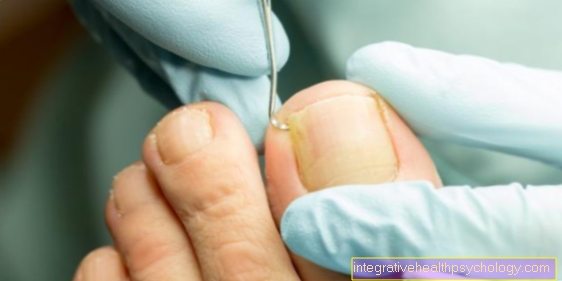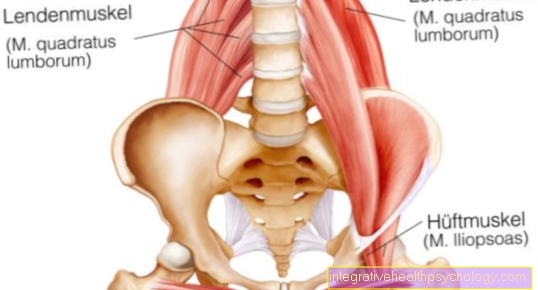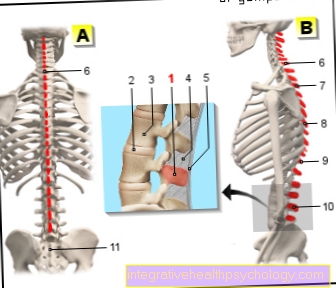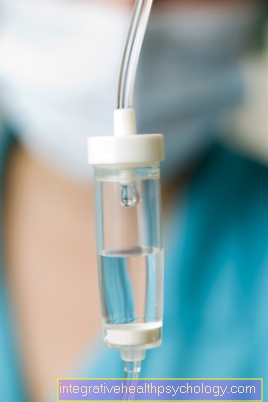Root inflammation in pregnancy
introduction
During pregnancy, the ligaments and tissues of the body are loosened - including the gums.
It is not uncommon for bacteria to have an easier time causing a tooth root inflammation at this time.
Of course, one of the most important concerns during pregnancy is the well-being of the unborn child.
What does it mean when it says: Your tooth root has become infected?

Tooth root inflammation is a disease that manifests itself through strong inflammatory processes in the area of the tooth roots and the tip of the tooth.
Apical periodontal disease is the medical term for such an inflammation of the tooth root.
In general, the inflammatory processes are provoked by strong caries infestation of the tooth and the spread of the responsible bacteria. The carious defect spreads from the outside through the tooth enamel into the inside of the dentin and in this way paves its way into the tooth root cavity. Both the pulp and the nerve fibers it contains are increasingly irritated and attacked. As a result, the typical inflammatory processes of a tooth root inflammation arise.
Carious defects are the most common cause of tooth root inflammation, but deep gum pockets, which arise in the course of gum inflammation or inflammation of the gums, or accidents such as a fall can be the cause of such a disease. In summary, it can be said that an irregular or poor oral hygiene is the main cause of the development of a tooth root inflammation.
In most patients, severe, sharp pain is the first symptom of this condition. Furthermore, many patients find both cold and hot drinks or food increasingly unpleasant. Sweet foods can also worsen the pain symptoms. But not every patient describes the occurrence of pain in the presence of a tooth root inflammation.
Read also: Toothache During Pregnancy
In these cases, the disease progresses very far before it can even be recognized. In addition, a periodontitis (Inflammation of the periodontium) root inflammation caused by severe reddening of the gums around the tooth. In addition, the formation of swellings in the area of the cheeks ("big cheek") is a typical symptom of an existing root treatment. These swellings are caused by accumulations of pus in the surrounding tissue and can become immense. During dental treatment, in most cases, a strong pain reaction can be noticed when tapping the tooth (Knocking pain).
Root inflammation during pregnancy
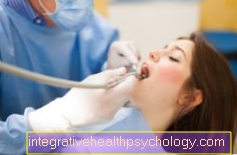
The gums are much looser around the tooth during pregnancy. For this reason, bacteria can penetrate deeper between the tooth and gum more easily and, in an emergency, provoke tooth root inflammation.
That is why it is important to pay special attention to careful oral hygiene, especially when you are pregnant. Teeth must be properly cleaned with a toothbrush at least twice a day. It is also advisable to invest time in the care of the interdental spaces once a day. The bristles of an ordinary toothbrush are not able to penetrate into the narrow spaces between the teeth.
For this reason, interdental brushes (Interdental brushes) and / or floss are used. In addition, special mouthwash solutions can help to reduce the number of bacteria within the oral cavity and thus prevent the development of tooth root inflammation. It can be used for both the mother and the unborn child without hesitation. In order to prevent the risk of a dental root treatment caused by a deep carious defect during pregnancy, if you wish to have children you should make an appointment with the dentist before conception.
Teeth affected by caries can easily be treated before pregnancy. However, if a tooth root inflammation develops during pregnancy, the necessary treatment cannot and should not be postponed until after the birth.
Such a disease must be treated urgently and promptly, because the risks of a long-term inflammation of the tooth root are relatively high. And the pain that such a disease brings with it cannot be expected of anyone for long. In general, getting proper dental treatment within the second trimester of pregnancy is the least likely to be a concern. This fact is due to the fact that the pregnancy at this point in time is particularly stable and the risk of triggering premature, stress-related labor is lowest.
The treatment of tooth root inflammation takes place under local anesthesia even during pregnancy. The treating dentist has access to active ingredients that are better tolerated by the unborn child than conventional anesthetics (for example: Articain with adrenaline). When choosing the anesthetic, the adrenaline content of the preparation is important, because it must not be too high during pregnancy.
The necessary x-rays are much more worrying than the anesthesia of the tooth to be treated and the actual hollowing out of the tooth root. These should only be made if absolutely necessary, as X-rays can generally have a damaging effect on the development of the unborn child. For this reason, the treating dentist will usually start the therapy without a previous X-ray and prepare the tooth so that the inflammatory processes cannot spread any further and the patient is painless.
The necessary root filling and the closure of the tooth may only be carried out temporarily. In order to be able to finally close the affected tooth, a so-called X-ray control image is actually necessary to check the position of the root filling.
Learn more at: Root inflammation in pregnancy
Which antibiotics are allowed?
Almost all antibiotic groups reach as high a concentration in the child's abdomen as in the mother's circulation, which is why they should be taken with caution and caution.
In general, penicillins are the antibiotic of choice both during pregnancy and while breastfeeding because they are the most effective in combating the bacteria in a tooth root inflammation. The penicillins include, for example Amoxicillin and Ampicillin. However, since resistance to penicillins or even allergies is becoming more common, the alternative antibiotic is used during pregnancy Clavulanic acid, which belongs to the beta-lactamase inhibitors, or Cefuroxime, which belongs to the cephalosporins.
Some dentists mistakenly believe that there is a root inflammation Clindamycin prescribed, although the effectiveness is in many cases only moderately satisfactory and the antibiotic has not yet been proven by research. Therefore, clindamycin should only be prescribed in an emergency, provided that all other subgroups are ineffective or an allergy prevails.
Find out more here: Antibiotics in Pregnancy
Can this be dangerous for my child?
Neither the antibiotics of choice during pregnancy, the penicillin subgroups, nor clavulanic acid or cefuroxime have complications during pregnancy or childbirth. These antibiotics endanger Not the health of mother and child and can therefore be taken.
There is insufficient research on clindamycin, which is why it should only be taken in an emergency.
Only in the group of macrolides like Erythromycin, which for many years was the antibiotic of choice, animal experiments revealed malformations in the newborn and complications during pregnancy. Therefore, erythromycin is strictly discouraged in order not to endanger the well-being of the child.
In general, however, it should be noted that the first three months of pregnancy is the most sensitive time when a spontaneous abortion, the death of the child, can occur. During this time you should refrain from taking antibiotics and rather use home remedies for the pain. From the fourth month of pregnancy, both of the following phases are considered to be relatively stable, which is why antibiotics can most likely take place here.
Home remedies for the pain
There are some myths about home remedies that are supposed to relieve pain symptoms in the case of tooth root inflammation, some of which, however, have no positive effect. During pregnancy in particular, expectant mothers are particularly sensitive when it comes to the unborn child and try their hand at home remedies before taking any medication.
In general, herbs are popular home remedies for dental problems. Carnation has been a part of dentistry for centuries and can calm the swollen and inflamed gums around the tip of the root and relieve pain. Because of this effect, clove oil is present in many materials within the dental office, such as luting cements and ointments.
You might also be interested in: Home remedies for gingivitis
Other herbs that are used as tinctures and rinses are lemon balm, peppermint, chamomile or St. John's wort.
Another home remedy that is popular is the juice of the savory. The savoy cabbage is boiled and poultices are dipped in and placed on the affected area in the oral cavity as a poultice.
None of the home remedies mentioned pose any risk to mother and child, as the substances cannot even reach the child's circulation as they are only applied locally to the affected area. Even if they reached the child inside the abdomen, they would not pose any threat to the unborn child.
Nevertheless, there is no guarantee or scientific evidence for its effectiveness.
Read more on the topic: Treatment of root inflammation






